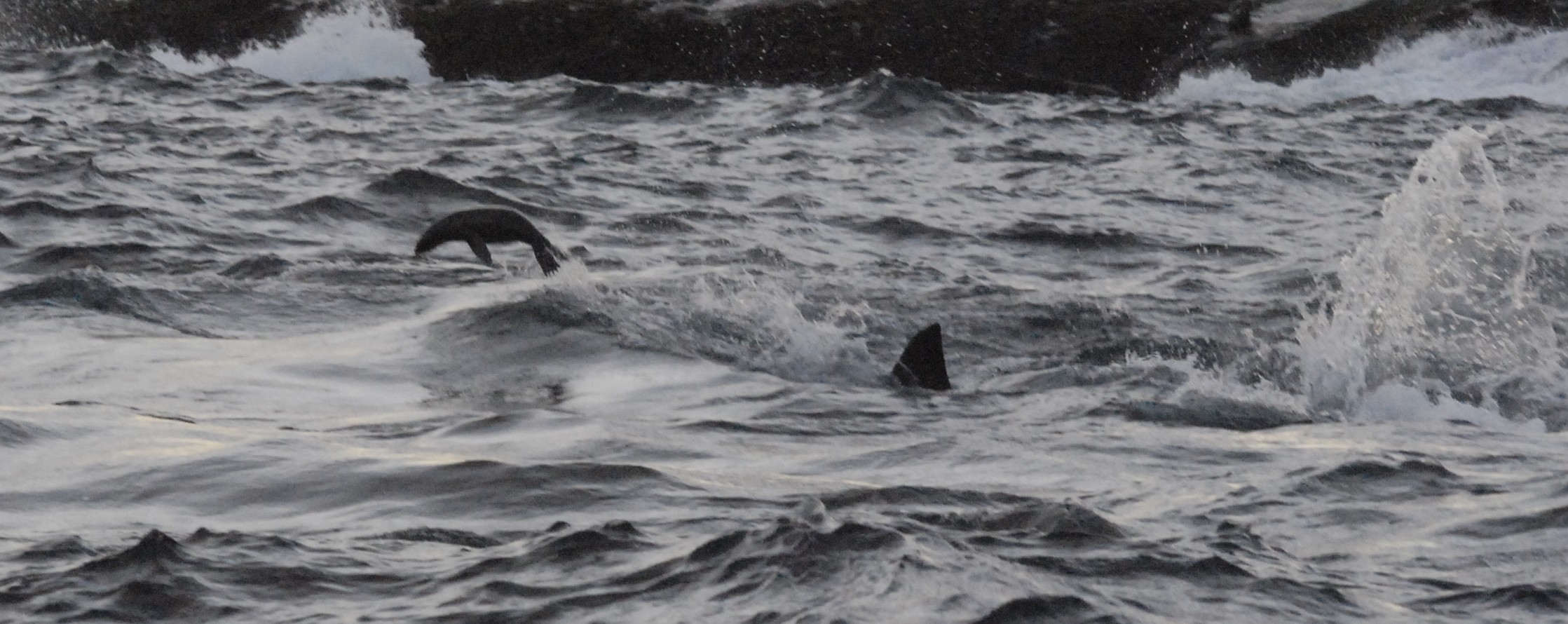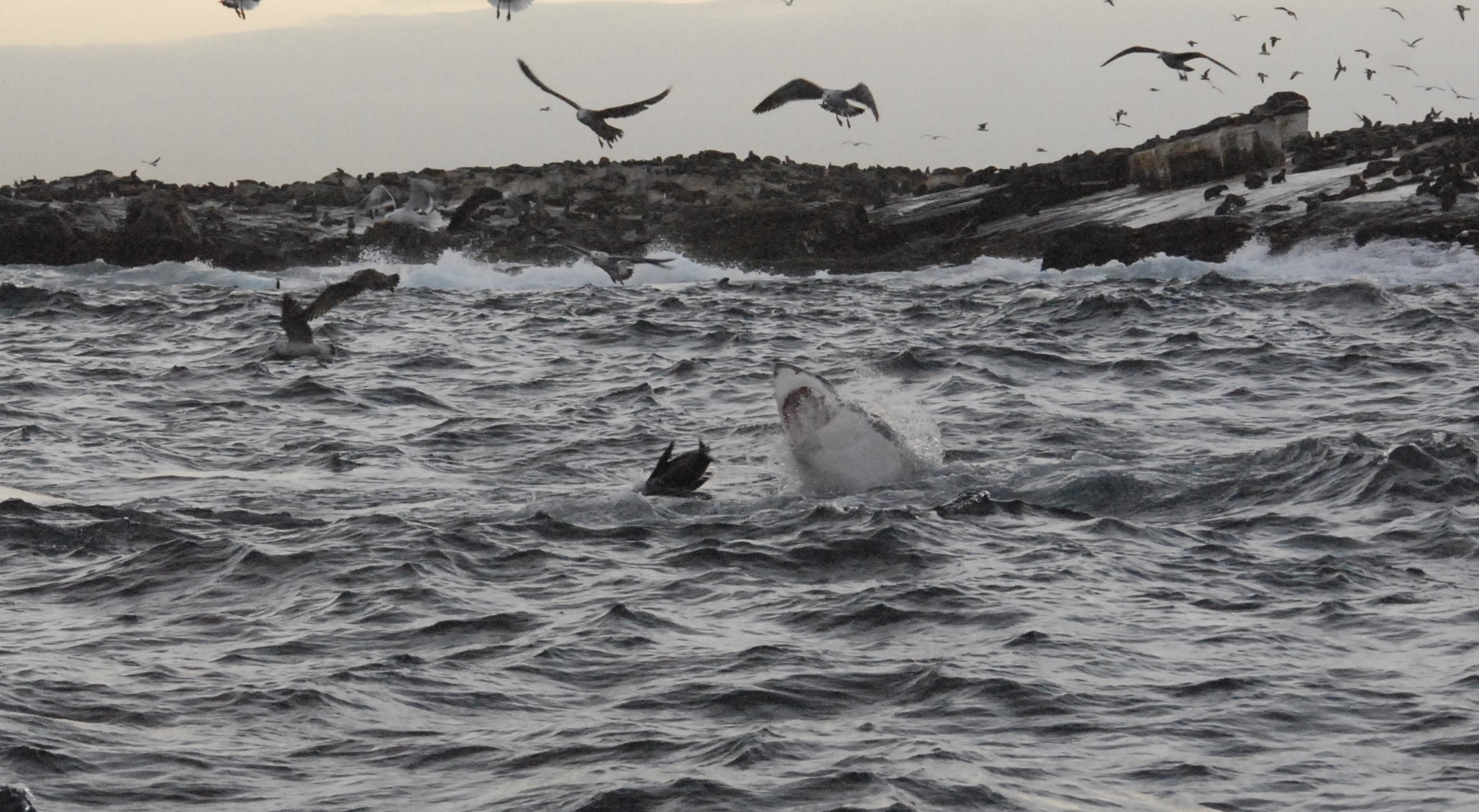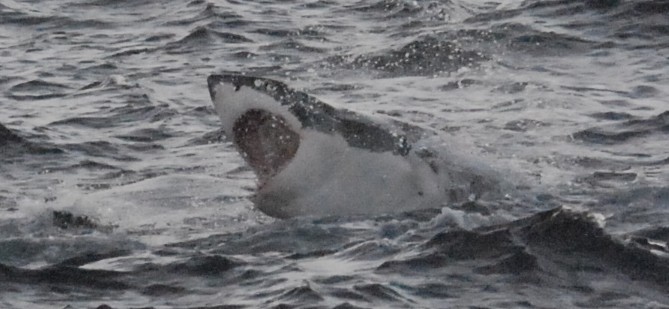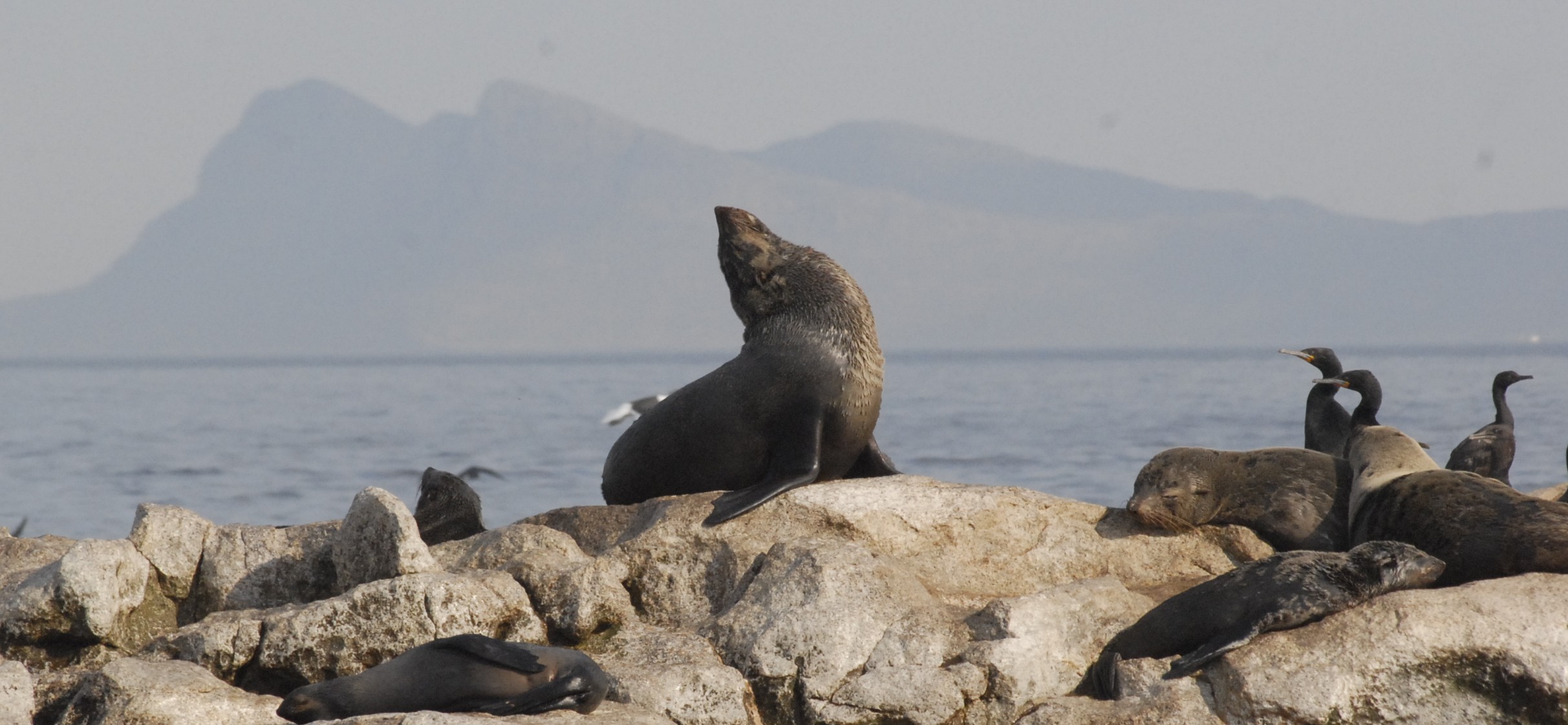Marine Life & Conservation
The Amazing Grace of Sharks
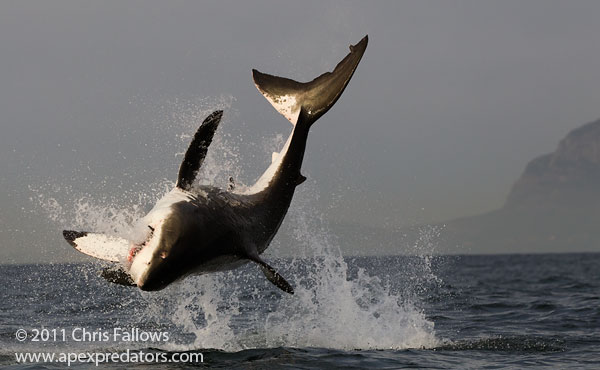
I feel as if I have been waiting atop the ocean in our boat for shark predation season to begin for such a long time and finally I can say it has arrived! For many a week now we have talked about the arrival of peak season (okay, make that many a month), and every time we have had a storm system pushing through the bay the crew have commented to one another that “this will be the storm, this is the one that will switch the sharks on to predatory mode.” And every time it hasn’t happened we have looked forward to the next storm and how that will be the one. It is fair to say I have been scanning the horizon every sunrise for signs that the sharks have begun hunting and, call me overenthusiastic, but I have been much like a child waiting for Christmas to begin.
Simply put I find this part of the year absolutely fascinating, both in terms of witnessing the sharks and seals’ natural behaviours and also in terms of sharing this special time with our guests. It is a privilege to see the look upon a person’s face when they observe a great white shark fly out of the water at high speed without so much as any warning that it was going to do so, especially when it is upon our decoy seal and everyone was watching. Peoples’ mouths drop open, they laugh, they smile, they are left speechless or they simply shout for sheer joy. There are so many different reactions but each one certainly contains pure wonder at what just happened and a childlike excitement when they realise they have captured the moment on camera. A memory that will last a lifetime. Great white sharks are enormous, incredibly powerful and yet so graceful and elegant when they are air borne. People tend to think of whale species when they consider the words breach, dance, grace and beauty. But for me these sharks are equally as beautiful when they arch above the water with their white bellies on display as an orange sun rises overhead and bathes the shark in warm light. And every breach is different, unique somehow. The sharks have an incredible ability to bend and twist into different positions and fly out of the water horizontally, vertically, curving sideways and even somersaulting over themselves at times before they re-enter the dark water below. Whilst this variety is most often seen when the sharks are hunting seals it can also be seen during decoy seal tows and, that most magical of moments, natural breaches. A moment when the shark leaves the water not in pursuit of a seal, fake or real, but for reasons we don’t fully understand. This year we have seen a high number of natural breaches and they are always especially acrobatic.
The difficult part of this time of year for me is when watching the sharks hunt the seals. Nature is stunning in her beauty and magnificence but yet where she gives, she also takes away and as the saying goes ‘nature can be cruel’. The seals upon the island are incredible predators in their own right and having spent months watching their social behaviours and seeing the youngsters grow and play within the shallows I find myself somewhat attached to and in awe of them. Not only do they live upon an exposed rock all year round but they have to travel through the waters of False Bay repeatedly in order to feed, which obviously involves learning how to survive in the event that they are pursued by a shark at any given time. I have watched on many occasions as a shark breached upon an unsuspecting seal and missed. When this happens the seal has the presence of mind to stop, look below the surface of the water, locate the shark and then swim to its tail or behind its jaws. The seal then twists and turns as the shark continues to pursue it from below and either the seal is eventually caught or the shark spends too much energy and loses interest. The seal can then continue onwards. Interestingly, the chances of a shark successfully hunting a seal drop dramatically if it misses the seal on the first breach and this dance between predator and prey begins. The younger seals have that presence of mind to behave in such a way when perhaps until that moment they have never even seen a shark and that makes them nothing short of exceptional in my opinion. Their clarity of mind, agility and ability to adapt to a situation that quickly is incredible and they deserve our utmost respect, which of course they have and we do everything possible to avoid interfering with their natural behaviour at such times.
Equally I find myself in awe of the sharks when they are hunting and I bear witness to their predatory abilities and also how humane they are when hunting. They do not play with their prey or take their time when making a kill. Often we find an event is over seconds after it has begun and the suffering of the seal involved is thankfully minimal. Of course a predation event does occasionally go on for a longer period of time and I find myself rooting for the seal to escape yet also recognising that the sharks are hungry and trying to survive themselves. It is an impossible situation as a human and I have talked about this with guests on occasion when they also find themselves not quite knowing how to respond. There is no single answer and so inevitably we all watch quietly, respectfully, and take the moment in knowing that both of these species are truly wonders of our natural world. And then before we know it another shark has breached, the crew have shouted ‘hold on’ and we have moved onwards at high speed to witness another of nature’s moments.
Whilst peak hunting season seems to have begun later this year, it has definitely been worth the wait. We still have the best to come as we move through July and into August with our sharks, which is also whale season in the bay. I am truly looking forward to welcoming back the southern right and humpback whales and enjoying their elegance and grace alongside that of our sharks.
To find out more about the sharks of False Bay, visit www.apexpredators.com.
Photos: Nicholas Curzon
Main Photo: Chris Fallows
Marine Life & Conservation
Paul Watson Released as Denmark Blocks Japan’s Extradition Bid

Renowned anti-whaling activist Paul Watson has been released from custody in Greenland after spending five months in detention. Denmark’s Justice Ministry rejected Japan’s request for his extradition, citing insufficient guarantees that his time already served in custody would be credited against any potential sentence.
The 74-year-old Canadian-American was arrested on July 21 in Nuuk, Greenland’s capital, when his ship docked to refuel. His arrest was based on a 2012 Japanese warrant related to a 2010 encounter in Antarctic waters. Japan alleged Watson obstructed operations and caused damage to a whaling research ship during efforts to disrupt illegal whaling. Watson has consistently denied these claims, maintaining his commitment to marine conservation.
Denmark, which oversees extradition matters for Greenland, concluded that while the legal conditions for extradition were met, the lack of assurances from Japan regarding time-served credit made extradition untenable.
In a video shared by his foundation, Watson expressed gratitude and relief, saying, “After five months, it’s good to be out… and good to know they’re not sending me to Japan.” He added that the most difficult part of his time in custody was being separated from his two young sons.
Watson is a pioneering figure in marine conservation, known for founding the Captain Paul Watson Foundation in 2022 after decades of activism with the Sea Shepherd Conservation Society. His bold efforts to defend marine life have earned him widespread support, including from celebrities and conservationists. His work has also been featured in the acclaimed reality TV series Whale Wars.
Watson’s lawyer, Jonas Christoffersen, praised the decision, stating, “We are happy and relieved that Paul Watson is now free.” He added that Watson is eager to reunite with his family and continue his vital work.
The arrest occurred while Watson’s vessel, the M/Y John Paul DeJoria, was en route to the North Pacific with a team of 26 volunteers to intercept a Japanese whaling ship. His foundation described the arrest as politically motivated and emphasized that Watson’s actions were focused on ending illegal whaling practices.
Japan resumed commercial whaling in 2019 after leaving the International Whaling Commission, asserting that whale meat is a cultural tradition. Conservationists, however, continue to challenge these practices, highlighting their impact on marine ecosystems.
Despite the challenges, Watson remains steadfast in his mission to protect marine life and bring attention to whaling practices. His dedication to ocean conservation has made him a globally respected advocate for the environment.
Marine Life & Conservation
12 Days of Zero-Waste Fish-mas

This holiday period, the Marine Conservation Society, the UK’s leading ocean membership charity, invites you to make some simple changes to eating fish this Christmas to help our seas.
Dr Kenneth Bodles, Head of Fisheries and Aquaculture at the Marine Conservation Society, said, “During the festive season, our consumption increases, but so does waste. Sustainability isn’t just about where food comes from – it’s also about how you use it. By reducing waste and making the most out of your seafood, you’re not only taking steps to be more ocean-friendly, but can also help to cut costs during what is often one of the most expensive times of the year”.
The Marine Conservation Society has compiled twelve tips on how to consume seafood sustainably with zero-waste this Christmas:
Buy whole fish instead of fillets
Instead of fillets, consider buying whole fish such as salmon, hake, or lemon sole. By adopting a “nose to tail” approach with cooking, whole-baked fish not only feeds a crowd, but also helps to minimise waste and maximise sustainability by using up every part of the animal, including bones, skin, and fat.
Make fish stock
Leftover fish bones or shells can be put to good use by boiling them to make a nourishing fish stock or bisque. This can be frozen and preserved for later use and makes for a flavourful base in a soup.
Make your own fish pâté
Avoid waste by turning leftover fish, such as smoked mackerel or salmon, into a delicious pâté by blending with cream cheese and lemon. Perfect when paired with crackers.
The sustainability of salmon and mackerel varies depending on where and how it is caught or farmed. For more information on green-rated options, check the charity’s Good Fish Guide.
Buy frozen
By purchasing seafood that is frozen or vacuum-packed, this helps to reduce waste by extending the shelf life of your food.
Fish pie
If you’re wondering what to do with leftover cooked fish, why not opt for a classic fish pie with mashed potatoes, leeks, and a cheesy sauce? A sure crowd pleaser on Boxing Day.
Use the head
Don’t forget the fish head! The meat is incredibly tender and flavourful. The charity recommends a cod’s head curry or recreating Fallow’s renowned cod’s head in siracha butter.
By stretching your ingredients further, not only is this a more sustainable way to enjoy seafood, but also cost-effective by repurposing leftovers and cooking creatively.
Boxing Day brunch
Mix leftover kippers or smoked salmon with scrambled eggs for a tasty, zero-waste, Boxing Day brunch.
For best choice, make sure you buy kippers, or herring, from the North Sea and the North Irish Sea.
Zero-waste storage
A top tip from the Marine Conservation Society to avoid waste is freezing fish offcuts to save for future use.
Crisp up the skin
Even leftover fish skin can be turned into a quick savoury snack by crisping it up in an air fryer with a little olive oil and salt.
Anchovies two ways
Leftover anchovies can either be blended with butter to make a delicious anchovy butter or tossed into pasta for a hit of umami flavour.
The charity recommends opting for anchovies caught in the Bay of Biscay for best choice.
Fishcakes
For an easy, zero-waste meal, leftover seafood trimmings can be mixed with mash and fried in breadcrumbs to make fishcakes.
Pickled mussels
Try pickling mussels in 1:1 vinegar and water, with a dash of sugar for a sustainable, zero-waste snack that can be enjoyed well beyond the festive season.
Mussels farmed in the UK are a seafood superhero. Grown using low-impact methods and harvested by hand, they get all the food they need from the sea around them. This makes them one of the most sustainable, ocean-friendly, and cost-effective seafood options.
Players of People’s Postcode Lottery have raised £6.6M towards the Marine Conservation Society’s vital work in making seafood more sustainable.
Laura Chow, Head of Charities at People’s Postcode Lottery, said: “Fish is a festive favourite for many, but making sustainable choices when it comes to how we buy and eat seafood makes all the difference for our ocean. Support from players of People’s Postcode Lottery has helped the Marine Conservation Society further its sustainable seafood work, so that we can all enjoy healthier, better protected seas.”
The Marine Conservation Society encourages you to make sustainable seafood choices a year-round habit, not just for Christmas. To check how sustainable the seafood on your plate is, you can visit the charity’s Good Fish Guide. The Guide helps consumers and businesses identify the most sustainable seafood using a simple traffic light system, based on where and how species are caught or farmed. Green is the best choice, amber means improvements are needed, and red indicates fish to avoid buying.
Zero-waste gift idea
Why not embrace a zero-waste Christmas by gifting a membership to support marine conservation? It’s a meaningful, low-waste gift that helps protect our ocean for generations to come. Memberships start from as little as £5 a month – the price of a sandwich and drink from your local coffee shop.
Find the latest sustainable seafood advice for wild-caught and farmed seafood on the Good Fish Guide, downloadable to your phone from www.mcsuk.org/goodfishguide.
-

 News2 months ago
News2 months agoIconic SS United States to become the World’s Largest Artificial Reef
-

 News3 months ago
News3 months agoBook Review – 52 Assignments: Underwater Photography
-

 Gear News3 months ago
Gear News3 months agoDYNAMICNORD – New German diving brand enters the British market
-

 News3 months ago
News3 months agoExploring Cenote El Pit: A Diver’s Dream
-

 Gear News3 months ago
Gear News3 months agoTry BARE drysuits (and maybe even win one!) this Friday with Sea & Sea at North West Dive Fest
-

 Marine Life & Conservation3 months ago
Marine Life & Conservation3 months agoBook Review: Coral Triangle Cameos
-

 Blogs2 months ago
Blogs2 months agoDive the Egyptian Red Sea this Autumn with Regaldive
-

 News3 months ago
News3 months ago2024 Ocean Art Underwater Photo Competition Announced


